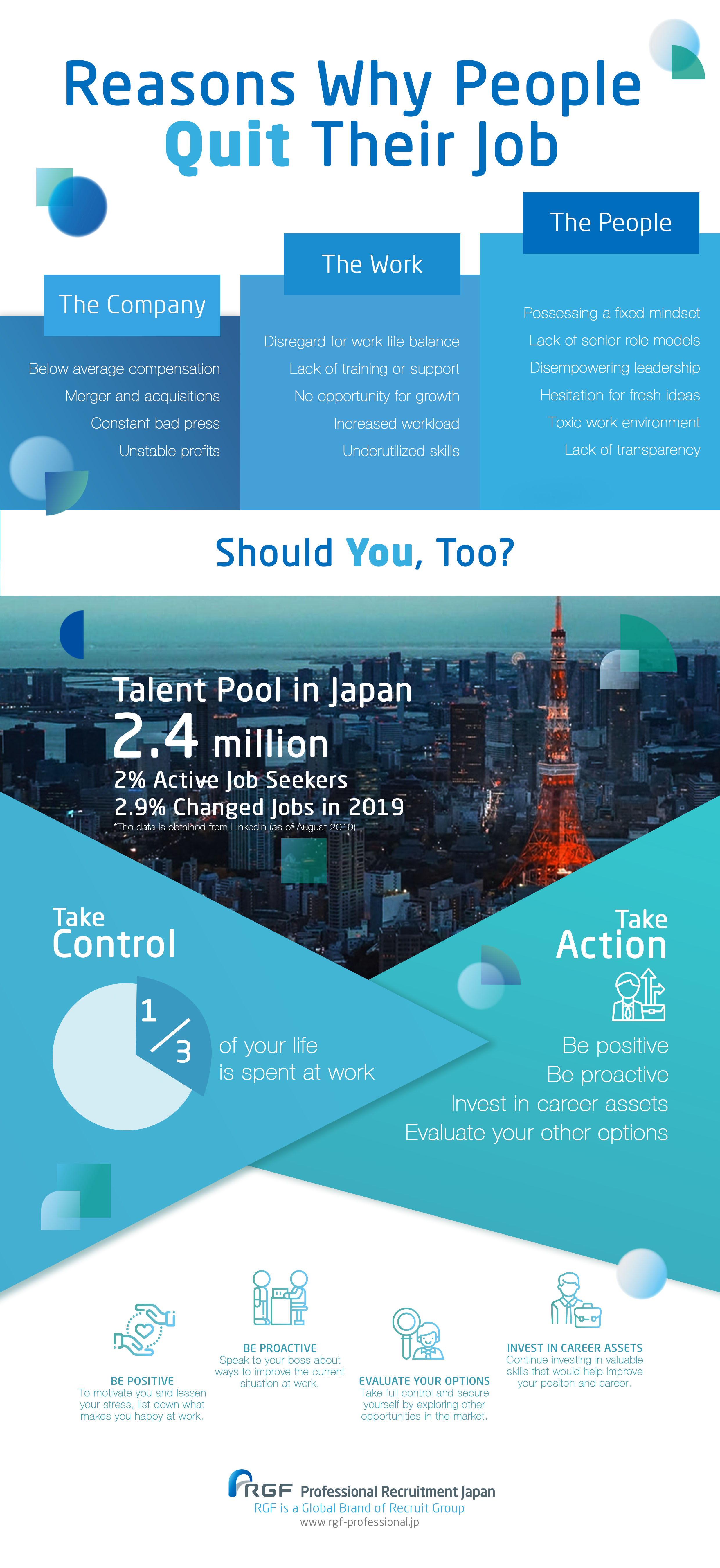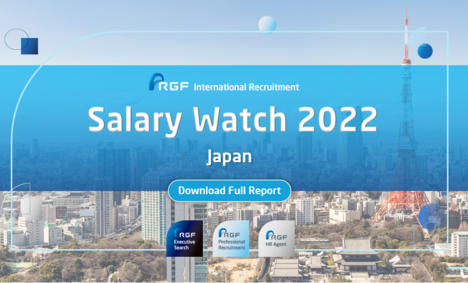
Since a third of your life is spent at the office, it’s important that you feel contented and proud of your professional contributions. However, stress, burnout, and disengagement from work are all becoming increasing problems for employees and employers alike. If you’ve felt a strong need to leave your job, you aren’t the only one.
Although the occasional feeling of discontent may be considered normal, you should be more wary once you start hearing a nagging inner voice that keeps pushing you to quit your job. But how do you determine if it’s just the usual daily grind or if you’re actually on the brink of experiencing burnout at work?
Here are some signs that you’re suffering from too much stress at work:
- Feeling of exhaustion: mentally, physically, and emotionally
- Trouble sleeping every night despite the exhaustion
- Forgetfulness, anxiety, and decreased focus leading to lowered productivity and poor performance
- Increased cynicism or pessimism towards your work and/or coworkers
- Increased irritability or outbursts of anger
- Constant dread for Mondays with the weekend serving as your only motivation
- Physical manifestations that your body needs a break: frequent illnesses, migraine, panic attacks, gastrointestinal problems, etc.
- Not meeting deadlines despite working overtime
- Constant feeling of dissatisfaction despite completing important projects or meeting deadlines
- Depression and feeling of hopelessness
If you’re experiencing some of the signs mentioned above, then you definitely need to act on it quickly to avoid further increasing your stress levels.
These are some tips to overcome stress and avoid severe burnout at work:
1. Identify the cause(s) of your stress and how it affects you
Once you realize that you are suffering from too much stress at work, it’s a good idea to take a deeper dive and fully understand what’s triggering this.
List down all the potential reasons why you feel stressed at work. Is it the people? Is it the work? Is it the company? Then, figure out how it’s affecting you so you could objectively analyze how your behavior at work is connected to these stress triggers.
Do the people you work with promote unhealthy competition? Does this lead to secrecy and lack of openness resulting in miscommunication within the team?
Do you often miss lunch breaks or take short breaks to meet deadlines and accomplish daily tasks? Does this cause you to feel exhausted and overworked, making you less eager to come to work the next day?
Do you feel like you’re not compensated enough for your work? Does this make you feel inferior and less motivated to provide excellent output?
Inspired by Priscilla Claman’s article on Harvard Business Review and RGF Professional Recruitment’s article on motivation, this list of 30 questions to ask yourself to help you decide if you should quit your job could help you identify the potential causes of your stress. By filling in this table with how the stress triggers affect you, you would be more aware and informed about why you feel stressed and the negative effects that come with it.
Through this, you would hopefully be able to understand and recognize the trigger points that are making you unproductive and unsatisfied at work.
However, it shouldn’t stop there. You can’t let the stress keep building up, making it take over your work and your emotions. You need to work on lessening this – otherwise, you might just burn yourself out into unrecoverable exhaustion. The best way to alleviate stress is to face it head-on: take control and take action!
2. Take control and take action!
There are things in life that you can control and things that you can’t. To make work less stressful, focus on improving elements of your job that you have control over or, at least, have the potential to change.
Begin with a break
One of the easiest and quickest ways to improve your motivation and performance at work is taking a break. Maybe you just need a well-deserved vacation to mend the situation!
Go travel to one of your dream destinations or go for a short trip to the countryside just to revitalize your senses. This will help reset and neutralize the overwhelming emotions and stress that you experience on a daily basis.

Photo Source: Colin Watts, Unsplash
The same goes for breaks during the workweek. Working during your lunch may seem productive, but in the long run, you will wear yourself out. Don’t forget to take advantage of these opportunities to reset and relax: don’t read work emails, don’t talk about work during lunch, do read a book, do take a nap, meditate, sketch, work out, watch some videos, network, hang out with your family, your friends…
Accumulated over time, these daily breaks of doing something relaxing in the middle of a workday would be greatly beneficial for your wellbeing, focus, and productivity.
Be positive
Capitalize on positivity. Having the right mindset can make a big difference at work and this is one aspect that you can have full control over. Through the list of questions above, you should already know what triggers your stress and how it affects you.
Try to consciously remind yourself about how these negative thoughts will only put a damper on your motivation and optimal performance at work.
If that doesn’t work, you could also list down everything that you enjoy at work – anything that’s meaningful or brings you happiness. It could be perks like overseas trips, free tickets to sporting events or even the simplest of things like delicious pantry supplies or your friends at work.
The longer the list, the better! Whenever a negative thought about work starts going through your head, always try to go back to this list of positives. By constantly reminding yourself why your job is amazing, sooner or later, you’ll find that you’ll be more and more motivated to work.
Be proactive
Sometimes being positive may not be enough. There’s a reason why you’re feeling dissatisfied and you need to address that issue through action, otherwise, it will keep eating you up, further lowering your morale and enthusiasm.
If you’ve found through the list that other people are causing your stress, why not take a step forward by voicing out your concerns? If your stress triggers are connected with the people you work with, the increase or lack of workload, or any looming uncertainties about the company, talk to your immediate supervisor.
It’s important to be open when discussing this with your boss. However, don’t come in without any possible suggestions to resolve the situation.
Complaining and discussing are two completely different ways of addressing a problem. Complaining is complacency, discussing is proactivity.
This list offers you a way to organize your thoughts so you could speak with your supervisor about the issues you’re facing.
3. Invest in yourself
Your job is your biggest investment. That’s a third of your entire life and you deserve to be happy at work. If you’ve taken control and taken action by being positive and being proactive, yet you still find yourself in the same upsetting situation that’s beyond your control, it’s time to explore your other options.
You’ve probably heard of the saying “Don’t put your eggs in one basket”. As with all investments, it’s always important to invest in several options as this decreases the risk of losing everything.
If you were to lose your job now because of too much stress, will you be ready to face its immediate consequences?
If you had to resign now because you’re just not growing at work anymore, will you be able to accept the uncertainty that may come with it?
By exploring your other options, you not only open yourself up to baskets full of more opportunities, you also lessen the risk of uncertainty. You’ll be able to be more confident, feel more secure about yourself, your future and the morale you need to keep your career afloat.
Looking for a job while you’re employed doesn’t necessarily mean you’re already quitting your current job. It doesn’t mean that you’re betraying your company and are a disloyal employee.
As long as you’ve tried to improve your current situation at work, looking for a job while you’re employed just means that you want to invest in yourself because you deserve to know if there are better options out there for you.
Go ahead, submit your resume, speak with a recruiter, and take full control of the biggest investment of your life.


Working at a global company has many advantages, not only for those who want to work globally and those who want to make use of their language skills, but also for people who strive to Unleash their Potential seek their own potential and have a healthy work-life balance.
RGF Professional Recruitment Japan supports the recruitment hiring activities of many of the top domestic and foreign capital companies in Japan. Various excellent companies including foreign and Japanese global companies located in Japan. Therefore, as a result, we can introduce the best career options for each person.to suite all types of career profile.
If you want to work in a global environment or globally, want to work in a place where you can perform more, or want toto a higher level and expand your career options in the future, please contact us. Our experienced consultants will do their best to support your career growth.






